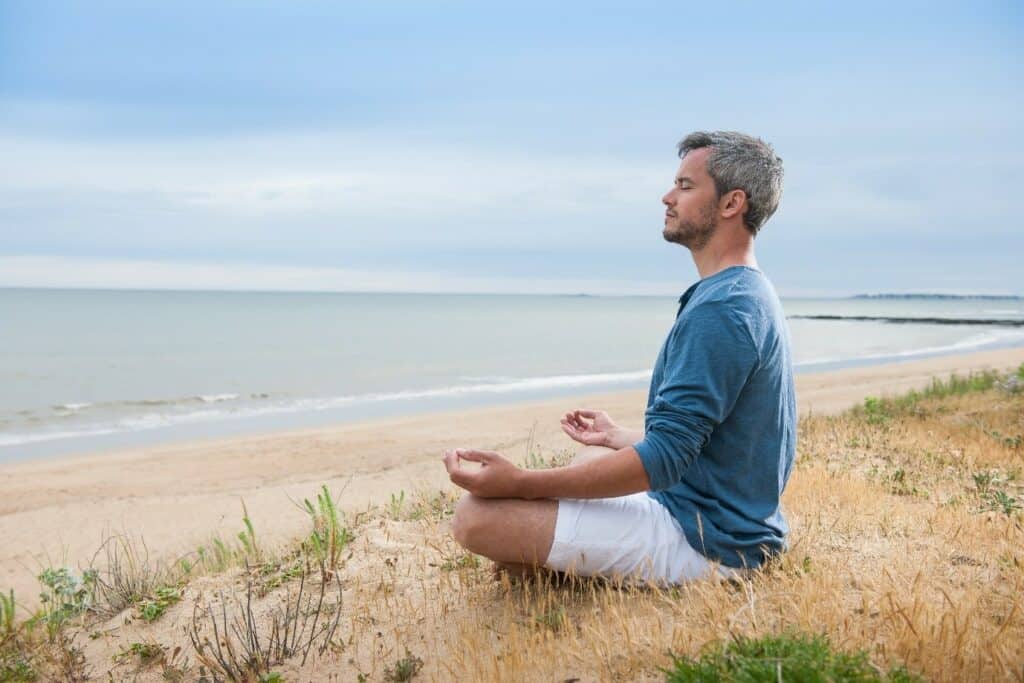A lack of sleep on a regular basis can affect all areas of your life. It can make you irritable, add to your stress levels and affects your mental health.
A survey by the Sleep Health Foundation found that around 60% of Australians experienced at “least one chronic sleep symptom”. And this is preventing them from leading a happy, healthy life.
Are you one of those who tosses and turns at night and finds your mind racing with thoughts you cannot turn off? Do you wake in the middle of the night and find you cannot get back to sleep? Or maybe you have a diagnosis of insomnia and take medication to sleep. Being awake is so frustrating when all you want to do is sleep.
But when you use the right approach, it can help you to consistently fall asleep quickly. According to research, you can use relaxation techniques to change your sleep habits. Using these will help you to mentally and physically relax so you drift off to sleep before you know it.
It will take practice for relaxation techniques to work so persist. The really good thing is you can customise them to make them work for you.
Create an Environment to Help you Relax
Relaxation is central to many cultural and spiritual practices to help you connect with yourself and your environment. There are four things in particular you can do to create a relaxing environment:
- Calm, peaceful space. It is going to be difficult to relax with loud noises in the background. You need a calm, peaceful space to relax in. Play calming music quietly in the background.
- Focus your attention. Use a mantra, mental image, word, breathing or phrase to focus your attention to help reduce your mind from wandering to external thoughts.
- Let it happen. Accept that your mind will wander while doing relaxation techniques. Remain at ease and let it happen. Just gently bring your attention back to what you were focusing on.
- Get comfortable. It is vital to find a cosy place to get comfortable. So if you are trying to go to sleep, get comfortable in bed.
When practicing the following techniques, remember you can adjust them to suit you.
Before you go to Bed
Before going to bed, use these simple tips to prepare you for sleep:
- Turn off your phone, tablet and other electronic devices as they stimulate your brain.
- For at least half an hour before bedtime spend time doing relaxing activities, such as reading or burning essential oils like lavender to help you relax.
- Avoid alcohol, caffeine, spicy food and eating large meals close to bedtime.
- Make sure your bedroom is at a comfortably cool temperature.
Breathing Techniques to Help you Sleep
Try one of these breathing techniques to help you sleep once comfortable in bed.
Practice Controlled Breathing
Controlled breathing is an excellent way to start if you are new to relaxation techniques or have trouble focusing on an object such as an image or a word. Taking a series of slow, deep breaths can help you feel calm.
To count your breaths:
- Gently inhale through your nose slowly.
- Gently exhale through your mouth to the count of five.
- Try to breathe this way for 10 minutes or until you feel your stress melt away and your mind relax.
Deep Belly Breathing
Deep belly breathing is another simple technique to help you relax before sleeping:
- Lie on your back in bed and rest your hands on your belly palms down. This will allow you to feel the breath as it enters this area.
- Slowly inhale and imagine your belly is a balloon you are inflating.
- Exhale just as slowly as you inhaled, letting the air out gradually.
- Repeat this breathing several times. Focus on keeping your breathing even, smooth and deep.
When you do this technique properly, it can relax all your muscles and your mind, promote an even exchange of oxygen and carbon dioxide, and calm your nervous system.
Breathing 2:1
Exhaling is the part of breathing that relaxes you while releasing carbon dioxide. So exhale for twice as long as you inhale as it can put you into a more relaxed state. You can use this when you feel stressed or are in pain as well as to help you sleep.
While doing deep belly breathing:
- Inhale to a count of four.
- Exhale to a count of eight.
Practice Mindfulness Meditation
Mindfulness meditation is about focusing on the moment without judgement while breathing slowly. It has many health benefits including helping to reduce insomnia.
Anyone can benefit from mindfulness meditation but it can take practice to get used to it.
Mindfulness Basics
Practicing mindfulness allows you to break down conditioned responses. Here are the basics:
- Time and space. All you need is to put aside some time daily and have a comfortable space to use.
- Focus on the present. Mindfulness is not about quieting your mind. Its purpose is to help you to focus on the present without judging what is going on.
- Let any judgements go. When you start to make a judgement while practicing mindfulness, acknowledge it and let it go.
- Refocus when your mind wanders. It is normal for your mind to wander. So bring it back to the present every time your thoughts start to wander off.
- Refrain from judging yourself. Refrain from judging yourself when your mind wanders. Just recognise this is happening and refocus your mind to return to the present.
Often people say practicing mindfulness is simple. But, keep in mind, it is not always easy. The more often you do it, the better you become. Even download Terri’s free mindfulness meditation to help you.
Practicing Mindfulness Meditation
This meditation focuses on your breath:
- Get comfortable. Find somewhere to get comfortable. On the couch, on a cushion on the floor, on your bed or a chair.
- Position your legs. When sitting on the couch or a chair have the soles of your feet resting on the floor. If sitting on the bed or a cushion, sit cross-legged.
- Sit straight. Sit up straight naturally without forcing it.
- Position your arms. Rest your hands palms down on your legs with your upper arms parallel to your body.
- Lower your gaze. Instead of staring at something straight ahead, drop your chin and let your eyes become unfocused without necessarily closing them.
- Pay attention to your breathing. Pay attention to how it physically feels to breathe. Notice how the air moves through your nose as you inhale and out of your mouth as you exhale. Notice how your stomach and chest rises and falls with each breath.
- Notice when you mind wanders. Without exception, your mind will wander from focusing on your breathing. That is okay. You do not have to stop thinking. When you notice your thoughts wandering, gently return your focus to your breathing.
- Avoid reacting. Your mind may wander constantly. This is normal and you do not need to worry about it. Take note of the thoughts. Do not react to them. And bring your focus back to your breathing each time. No need to judge yourself or to have expectations.
- Look up when ready. Open your eyes if closed or let your eyes come back into focus when ready. Take the time to tune into the sounds in your environment. Also notice how you feel emotionally and any thoughts going through your mind.
Blissiree Pty Ltd
Suffering with insomnia is a nightmare. Not getting enough sleep each night or waking up in the middle of the night will play havoc with your physical and mental wellbeing. It can make you cranky towards everyone around you and can have a negative effect on many parts of your life. Lack of sleep can increase your stress and anxiety, and you may find it hard to concentrate. There are things you can do to help manage your insomnia, but this is not always easy without help.
The Blissiree Pty Ltd is pioneering a new technique. A natural treatment that may help you manage your insomnia. It only requires for you to relax. Highly trained facilitators help you learn how to deal with insomnia. This may help you start to get a good night of uninterrupted sleep or you may simply fall asleep easily without tossing and turning. You may even notice an improvement after the first session.
If insomnia affects your daily life, it is time to turn it around. Time to do something positive. Seek help. Take back control. You do not have to go through it alone. The sooner you get help, the sooner you can start taking good care of your mental health. And get back to enjoying life.
Reach Out
If insomnia is leaving you exhausted every day, reach out to our professionals. When you are not coping, contact us. We can talk to you about how to get your life back on track. But if you reach a crisis point, call us immediately. We are here to support you.
We can work with you over the phone, via Skype or in our Spa. Book in today for my special introductory offer of just $49 (private health rebates apply) so you may turn your life around. We aim to help you cope with any mental health challenges and the symptoms of insomnia that negatively affects your life. Our facilitators may help you manage your insomnia better so you start enjoying life again.
Let me Help you Manage Insomnia
My Emotional Empowerment Program has helped many people for more than a decade. My aim is to help you naturally deal with insomnia better so you may live a more normal life. The aim is to give you a new hope for the future. A future filled with happiness, peace and contentment in weeks not years so you can start living life to the fullest.
Book a free 25-minute telehealth consultation with Blissiree Pty Ltd founder, Terri Bowman. Or discover a seamless way that may help you manage your emotional and mental health by becoming a member where you can access more than 100 audio programs that may help you to live an inspired life.
Check out my latest documentary—Blue Rain – PTSD The Silent Suffering. Follow the lives of four people as I work with them to improve their mental health. It will give you good insight into what it is possible.
What are you waiting for? Try us now. You have nothing to lose.





